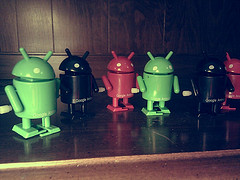It is time for Google to take control of Android


Colleague Scott Raymond has penned a rant that points out how this openness bites users where it hurts. His problems with a Samsung Galaxy Tab 10.1 were caused by Samsung deciding to change core Android code in a way that broke the Tab's ability to communicate with Google's backend servers. Read that statement again, and then go read Scott's piece in its entirety to fully understand what is going on with Android.
Breaking Android: Who is worse, Google or the OEMs?
Scott's take on the whole Tab situation is understandable, he wonders if the fault lies with Samsung or with Google. My take is simpler, I put the blame squarely on Google's shoulders as owners of the platform. No OEM should be able to change the core underlying code of Android for any reason. It is possible for a platform like Android to be open yet have core OS functions remain locked down. That's what Google should have done from the beginning, but the loose way it has approached Android has failed to do.I have been using Android phones and tablets since the beginning, and for the most part I love them. They work well most of the time and are a joy to use. That is the case until something goes wrong, and as Scott discovered it usually is the result of one of Google's partners changing something on a given device that jams up the pipes.
I always suspected this was the case and it was proven to me when I switched to the Samsung Nexus S 4G recently. The Nexus S is Google's flagship phone, and as such it bypasses all of the Samsung customizations in favor of running stock Android. This has resulted in a user experience better than I have experienced with all other Android devices. The operation of the phone is perfect, and the performance is stellar in every way.
This makes sense as Google uses the Nexus S to test Android builds before release. The device has no OEM changes to clog up the works, and Android runs flawlessly as a result. This demonstrates the benefits of locking down core parts of the Android OS, something Google desperately needs to do. The user experience varies so widely among Android devices that it doesn't do Google any favors, and eventually it will come back to haunt them.
I have ranted before about Google's need to take control of Android in regards to system updates and that remains unchanged. While the openness of the platform requires the participation of third parties in the update process, Google still needs to take control over how they are done to better serve Android device owners.
Google has acknowledged that is the case, and announced the formation of a coalition of major players at the Google I/O conference a while back. The sole purpose of this coalition is to make sure that Google controls the Android update process in order to guarantee that buyers of devices running the OS can be certain how and when system updates will reach them. Unfortunately, while smacking of good intentions nothing further has been heard about these improvements since the announcement.
My favorite tablet is still the original Samsung Galaxy Tab that I bought from Sprint. It's a good tablet that became even better when Sprint recently released a major update that upgraded it to Gingerbread. Unfortunately, those who bought the Galaxy Tab from other Google partners are still waiting for this update, further demonstration of the broken system.
The time for good intentions has passed. Android device owners need Google to take control and make things work properly. Keep the platform open where it counts, but lock down the core parts of the OS to make partners toe the line. Customers will thank you.
See related coverage:
- Breaking Android: Who is worse, Google or the OEMs?
- Time for Google to take control of the Android update process
- Rumor: Samsung planning 10-inch 'Gloria' tablet with slide-out keyboard
- SwiftKey X for Tablets: Good, but not quite ready
- 33% Of Americans Want Keyboard With Their Tablet; Should Android Makers Step Up?
- Acer intros 10.1-inch Windows 7 tablet with AMD processor
- HP's TouchPad tablet, smartphones put WebOS back into the game